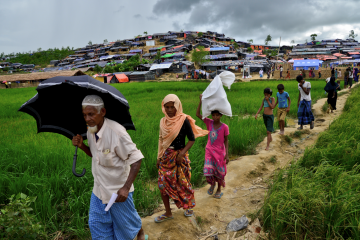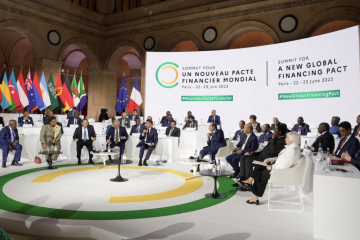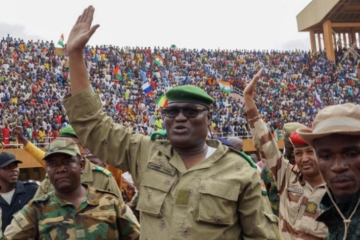
Geopolitical challenges hamper Rohingya repatriation from Bangladesh
The Rohingya refugee crisis as a trigger for displacement For decades, the Rohingya, a predominantly Muslim ethnic group in Myanmar, have sought refuge in neighbouring Bangladesh to escape persecution. This influx, particularly since 2015, has strained Bangladesh’s limited resources. The persecution of the Rohingya is a textbook case of ethnic cleansing by Myanmar’s civilian-military government. With around one million Rohingya refugees in Bangladesh, concerns have been raised about the safety of the host population . Despite intense diplomatic efforts, Myanmar, governed by a military junta since 2021, remains reluctant to repatriate its Rohingya nationals, causing frustration in Bangladesh. Previous repatriation attempts in 2018 and 2019 failed due to the Rohingya refugees’ fear of violence upon return. In Rakhine State, where …

The Paris Climate Summit: A Milestone for the Global South?
International summits are vital to promoting global agreement and laying the groundwork for future international cooperation. The Summit for a New Global Financial Pact took place in Paris, co-hosted by France’s President Emmanuel Macron and Barbados’ Prime Minister Mia Mottley. The Summit, organised with the aim of promoting global unity for international financial architecture form, set out to achieve four main goals focusing on fiscal sustainability and climate change in low-income countries. Amid the worldwide increase in extreme poverty and climate disasters, these conferences provide a platform for building coalitions to resolve urgent humanitarian issues. However, there has been a marked decline in international cooperation and the success of these events. In 2022, the United Nations Climate Change Conference COP27 …

Breaking the Domino Effect: How the West Should Respond to Niger’s Coup
On 26 July, Niger’s presidential guard launched a coup against President Mohamed Bazoum, announcing their seizure of power in a televised broadcast. As the dust of the coup begins to settle, Niger — and the international community — stand at a crossroads. The military junta’s success in maintaining power is far from guaranteed and has been widely condemned. Several states and supranational organisations, including the US, France, the EU, the Economic Community of West African States (ECOWAS), and the African Union (AU) have threatened the military junta with sanctions if it does not reinstate President Bazoum, and have even considered military intervention. However, the Sahel’s track record of successful coups suggests that Niger is likely to see further democratic backsliding, …

A New Battleground: Russia’s “Grey Zone” Warfare in the Sahel
As Russia’s invasion of Ukraine enters its second year, the Wagner Group has been expanding its Kremlin-backed footprint across the globe. In particular, the mercenary network has been deploying forces in Africa’s Sahel region, revealing how Moscow is strategically blurring the line between “anti-terror” operations, security-for-resources tradeoffs, and covert political influence. In recent months, U.S. officials have accused Wagner of exploiting resources in the Central African Republic (CAR), Mali, Sudan, and beyond in an effort to fund Putin’s “war machine” in Ukraine — a charge Moscow dismissed as “anti-Russian rage”. Beyond the Ukraine crisis, however, the group’s activities and atrocities are painting a dire picture of Russia’s long-term strategy to destabilise Western relationships and gain a foothold in the African …

China’s Role in Restructuring Debt in Africa
Africa’s public debt burden has doubled from 2010 to date. Data from the International Debt Statistics Data as of December 2022 shows that African countries owe $ 644855.2 billion (USD). The International Monetary Fund (IMF) and the World Bank consider 22 low-income African countries to be either in debt distress or at high risk of debt distress as of November 2022. Debt distress in this context means a country is experiencing difficulties in servicing its debt. A high debt burden could risk the continent’s economic growth, development, and climate investments. The additional global economic downturn and falling commodity process could compound the issue for countries on the continent. While there is no immediate threat of systemic and financial collapse due …

The Biden Administration Must Improve its Foreign Policy Toward Latin America
Historian Joseph S. Tulchin once described U.S.-Latin American relations as a “historical legacy of conflict.” Over the last two years, the Biden administration has neglected regional concerns in Latin America. With a new year ahead, the Biden administration must revaluate its relationship with the region with ample considerations of social geopolitical elements tinted with historic predispositions. Regional concerns cannot continue to be addressed from a preoccupied hardline position. As other nations outside the Western hemisphere strengthen their influence in Latin America, the time to disregard human dignity as imperative to current affairs must end. A U.S. Progressive Foreign Policy While the Biden administration has advocated for a foreign policy stipulated to adhere to international human rights norms, it has failed …

OxPol Blogcast. Women in Politics – In Conversation with Rachel Bernhard: Can Gender-Typical Appearance and Behaviour Help Candidates Win Office?
OxPol Blogcast showcases research, analysis, insights, and experiences from the members of the University of Oxford’s Department of Politics and International Relations (DPIR), and specialist guests from the Oxford academic community and beyond. Are masculine behaviour and appearance among the prerequisites for electoral success, in line with popular belief? On this episode, OxPol Blogcast host Anastasia Bektimirova is joined by Dr. Rachel Bernhard, an Associate Professor at the University of Oxford’s Department of Politics and International Relations (DPIR), to put the view of the political arena as a place favouring conventionally masculine traits to a test. Focusing on the United States, Rachel explains what is understood as masculinity and femininity in political leadership, and guides us through the observed variation in voters’ response to those cues. We also discuss …

OxPol Blogcast. Women in Politics – Formal and Informal Politics of Women’s Representation and Activism in Latin America
OxPol Blogcast showcases research, analysis, insights, and experiences from the members of the University of Oxford’s Department of Politics and International Relations (DPIR), and specialist guests from the Oxford academic community and beyond. On this episode, we are focusing on the state of women’s descriptive and symbolic representation in party and civil society politics across Latin American countries. OxPol Blogcast host Anastasia Bektimirova welcomes three guests to bring you the stories of women’s agency at different levels of political participation in the region. The guests are sharing their expert view on the social environment, political culture, policies as well as written and unwritten rules that are shaping women’s progress and experiences in pursuing elected office, and engaging politically from civil society. With Dr. Malu Gatto, an Associate …









